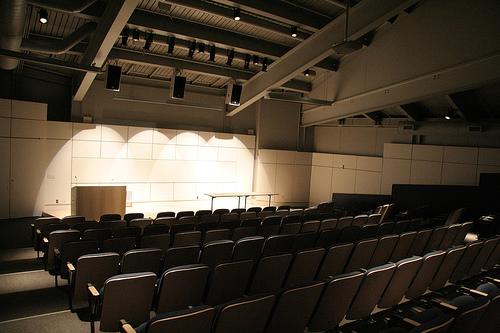One of my pet peeves as a university instructor is the student who arrives late to class. I was raised by parents who said “if you aren’t 15 minutes early, you are late.” That mentality has informed my work and school expectations. On the first day each semester, I tell students that being late is disrespectful to me and to their peers. I promise to be on time and ask them to be on time as well.
Borrowing from a tool I saw used at a military training, I implemented a policy a few semesters ago in which students who arrive late are expected to sing in front of the rest of the class. It can be a light-hearted way to teach a lesson about professional behaviors.
Last semester, we had off-key versions of Beyoncé’s “Single Ladies,” Taylor Swift’s “Love Story,” and a hearty rendition of “Dominic the Italian Christmas Donkey.”
As a behavior management tool, it is effective. Students report that they get to class on time because they don’t want to sing. Others say that singing once serves to motivate them to “never again.” The performances are usually humorous and allow us a chance to be silly while helping me get an important message across.
It’s not quite as funny when the behavior doesn’t change. We all lose our humor when a student is late two, three or four more times.
With the anniversary of the 9-11 tragedy this past weekend, the media was full of tributes honoring the lives of those lost on that horrible day nine years ago. As I flipped channels, I noted that all of the major news outlets had survivor interviews or video montages of one of the worst days in American history. The newspapers reported on ceremonies — both locally and nationally — paying tribute to the innocent Americans who were killed as they were going about their day-to-day lives on that horrific morning. We honored the emergency personnel who demonstrated incredible bravery in helping their fellow man, many of whom made the ultimate sacrifice.
I couldn’t help but wonder if somewhere the people who were behind the greatest act of terrorism on American soil were relishing the fact that their actions that day are still having an impact on our country. I wondered if the continued attention given to the act, as well as the individuals responsible, somehow serves to motivate their comrades to continue the bad behavior.
A college student arriving late to class is hardly the same as a terrorist act, but the very basic principles of stopping bad behavior apply to both.
Anyone who works with kids understands the need for firm limits and follow-through on consequences if negative behavior is to be stopped. Do those same principles apply on a national level? What are the messages that we send to those who want to hurt us? How does our reaction serve to discourage or reinforce continued bad behavior?
We’ve all seen kids scream, cry and throw a temper tantrum when they are told no. The parent says, “stop that” but does nothing effective to stop the bad behavior. The bad behavior continues. Sometimes the parent gives in to the child’s screaming just to stop the outburst. That parent is puzzled then when that same bad behavior resurfaces on the next outing. Weak commands to stop followed by positive reinforcement of the behavior only serves to repeat it.
When the second plane hit the South Tower on that September morning, we knew it wasn’t an accident, but a deliberate attack on our lifestyle. Our response on that day and to the constant threat of terrorism since then has become politicized, idealized, romanticized and demonized. Instead, our response should be consistent and with the very firm message that “we won’t tolerate that bad behavior.”
Intolerance for bad behavior has nothing to do with race, religion, nationality or anything else. I frankly don’t care if it’s the one-eyed, one-horned, flying purple people eater. If people do something bad, there should be consequences for behavior.
The student who arrives late usually tries to squeeze into a seat without being noticed. The other students immediately look at me to see what I’m going to do. If I let it go, then there is no point in having the policy in the first place. In almost all cases, I invite the tardy student to join me at the front of the classroom. If they can’t think of a song, I make suggestions (or at times take requests from the audience).
However, the student who is repeatedly late doesn’t enjoy the continued benefit of my humor. I have been accused of “calling out” a student in front of his peers and asking him why he chose to disrespect us that day.
Similarly, when our enemies lie to us, harm our citizens, put our freedom at risk or use us to further a cause, the consequences and follow-through should be consistent and without exception.
What happens when we don’t set limits? I guest lectured at a class last semester where the instructor doesn’t discipline tardiness. I counted 11 students arriving well after the start of class. No one even gave them a second glance.
The building of a mosque so close to hallowed ground sends a message. Until we are clear that the message is not to celebrate the attack or raid on America, we should respectfully ask the planners to make another decision. The mosque debate is more than just about religious freedoms. It’s about setting limits and sending a message about what we will tolerate in bad behavior.
Like the parent of the toddler who is throwing a temper tantrum, we should not let the fear of more temper tantrums prevent us from stopping unwanted behavior. How else can we show tribute to those who fell on September 11th?



